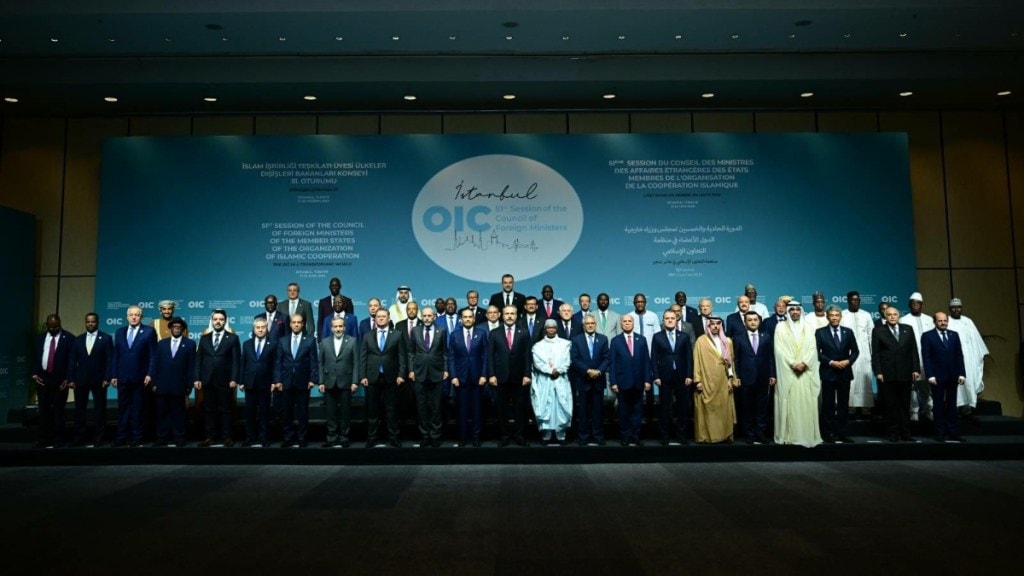The Organisation of Islamic Cooperation (OIC) on Sunday strongly condemned recent Israeli strikes on Iran, Syria and Lebanon, calling on the international community to take immediate action. The Istanbul Declaration, adopted after the 51st session of the OIC Council of Foreign Ministers, described these attacks as blatant violations of international law and national sovereignty. It also urged strict adherence to regional treaties, such as the Indus Waters Treaty between India and Pakistan, to prevent further destabilisation across South Asia and the Middle East.
The declaration urged world powers to halt this aggression and hold Israel accountable for its actions.
What was discussed at the OIC meeting?
The OIC also announced the formation of an open-ended Ministerial Contact Group, which will liaise with regional and international actors to de-escalate tensions, stop further strikes on Iran, and work towards a peaceful resolution. Leaders emphasised that failure to act could have serious consequences for regional stability, with the potential for tensions to spill over into the wider Middle East.
Turkish Foreign Minister Hakan Fidan underlined the role of the OIC as the “voice of the Muslim world,” noting that 156 resolutions had been adopted to reflect the shared concerns of member states. “Israel’s aggressive policies pose a threat to all of us,” he added, calling for unity among Muslim nations.
Commitment to Palestinian rights
Foreign Minister Fidan also reiterated the OIC’s founding mission, which was established in 1969 after the arson attack on Al-Aqsa Mosque. “We will not allow Israel’s strategy of spreading conflict across the region,” he said. The Istanbul Declaration reaffirmed support for Palestinian rights, condemning Israel’s actions in Gaza and the West Bank as genocide and systemic oppression. It called for a permanent ceasefire and the full implementation of all UN Security Council resolutions to rebuild Gaza.
Istanbul Declaration adopted by the Ministers of Foreign Affairs and Heads of Delegation of the Member States of the Organization of Islamic Cooperation (OIC), at the conclusion of the 51st Session of the Council of Foreign Ministers (CFM), held in Istanbul, Türkiye, on 21-22… pic.twitter.com/1T91RGn2jM
— Ministry of Foreign Affairs – Pakistan (@ForeignOfficePk) June 23, 2025
Focus on the Indus Waters Treaty
Besides the focus on the Middle East, the Istanbul Declaration raised concern over South Asia, condemning recent military strikes on Pakistan and Pakistan-occupied Jammu & Kashmir. The OIC urged all sides to exercise restraint and stressed the need to respect existing treaties, including the Indus Waters Treaty (IWT). The declaration emphasised the importance of upholding bilateral agreements and pursuing broad-based dialogue to resolve disputes peacefully. It also expressed deep concern over the recent military escalation in South Asia and called on all parties to avoid actions that could further destabilise the region.
US strikes on Iranian nuclear sites
The OIC session also took place alongside US President Donald Trump’s announcement that American B-2 stealth bombers had successfully struck Iranian nuclear sites at Fordow, Natanz and Isfahan. In response, Iran called for an emergency session of the UN Security Council to hold the United States accountable. Delegates in Istanbul denounced the strikes as yet more evidence that unchecked Western actions could destabilise the region further and increase the risk of conflict.
OIC urges Muslim world to stand united
With the formation of new contact groups and a strong collective message to aggressors, the OIC and its member states vowed to stand together in defence of their shared interests and global peace. Fidan concluded by calling on Muslim nations to work together despite their differences, “so that all our prayers will rise as one voice against oppression.”

